In 2024, the Bangladesh Rice Research Institute (BRRI) showcased a robust presence in the Web of Science, with 94 publications spanning diverse disciplines, notably Multidisciplinary Sciences, Plant Sciences, and Agronomy, reflecting its comprehensive approach to rice research. Articles dominated the publication types, underscoring a focus on original research, while international collaborations with countries like the People’s Republic of China, the United States, and Australia highlighted BRRI’s global research network. Key publishers included Elsevier and Springer Nature; the Science Citation Index Expanded was the primary index. This output, driven by researchers like Md Abdur Rouf Sarkar and Sanjida Akter, demonstrates BRRI’s pivotal role in advancing rice science, raising questions about the impact of its publication strategies, the drivers of its multidisciplinary focus, and the influence of global partnerships on research quality. Web of Science
The leading areas of research publication categories in the TreeMap:
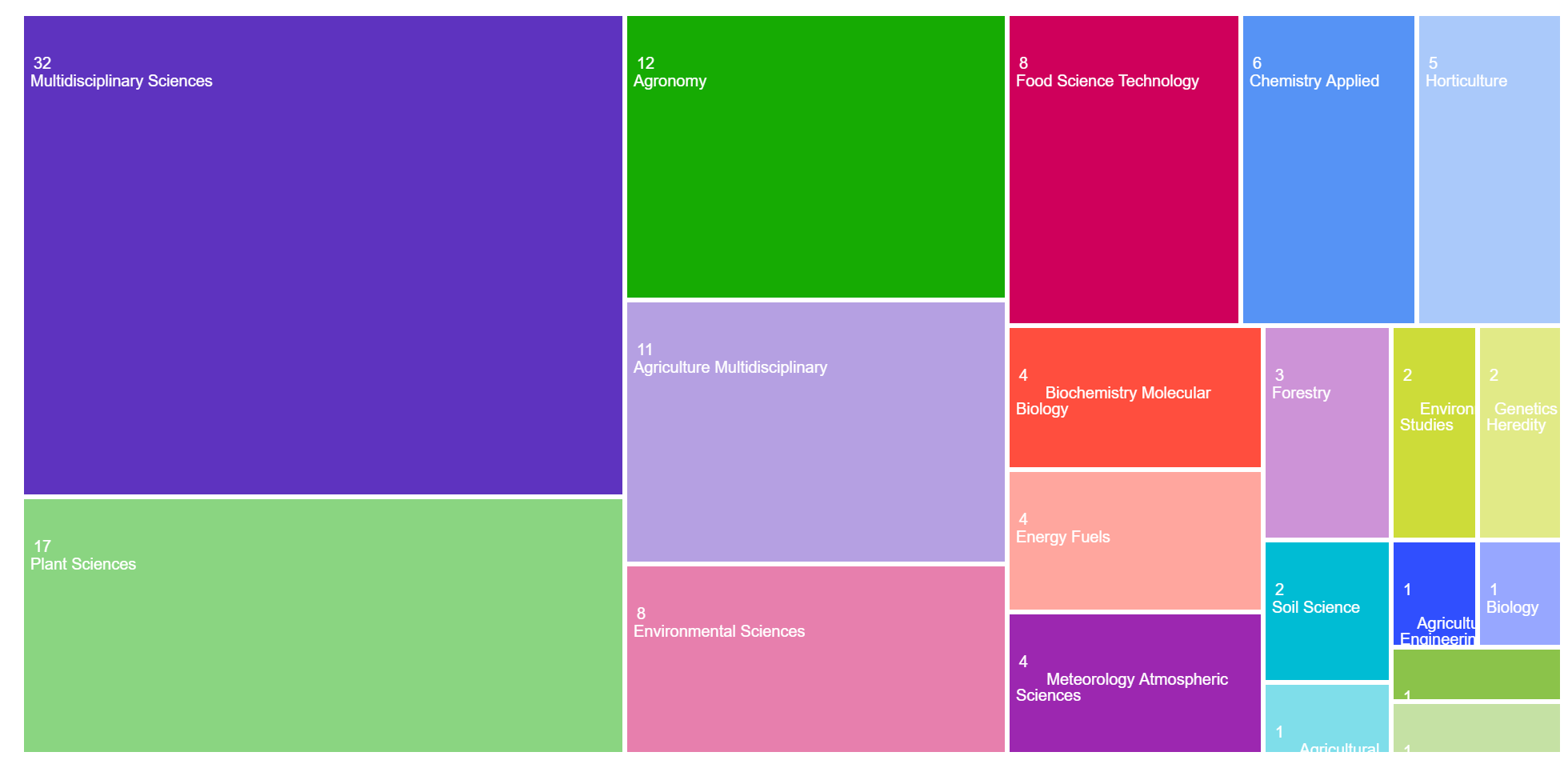
Research contributions in the fields:
| Categories | Record Count | % of 94 |
|---|---|---|
| Multidisciplinary Sciences | 32 | 34.043% |
| Plant Sciences | 17 | 18.085% |
| Agronomy | 12 | 12.766% |
| Agriculture Multidisciplinary | 11 | 11.702% |
| Environmental Sciences | 8 | 8.511% |
| Food Science Technology | 8 | 8.511% |
| Chemistry Applied | 6 | 6.383% |
| Horticulture | 5 | 5.319% |
| Biochemistry Molecular Biology | 4 | 4.255% |
| Energy Fuels | 4 | 4.255% |
| Meteorology Atmospheric Sciences | 4 | 4.255% |
| Forestry | 3 | 3.191% |
| Environmental Studies | 2 | 2.128% |
| Genetics Heredity | 2 | 2.128% |
| Soil Science | 2 | 2.128% |
| Agricultural Economics Policy | 1 | 1.064% |
| Agricultural Engineering | 1 | 1.064% |
| Biology | 1 | 1.064% |
| Biotechnology Applied Microbiology | 1 | 1.064% |
| Cell Biology | 1 | 1.064% |
| Ecology | 1 | 1.064% |
| Economics | 1 | 1.064% |
| Geosciences Multidisciplinary | 1 | 1.064% |
| Green Sustainable Science Technology | 1 | 1.064% |
| Marine Freshwater Biology | 1 | 1.064% |
| Mechanics | 1 | 1.064% |
| Thermodynamics | 1 | 1.064% |
| Veterinary Sciences | 1 | 1.064% |
| Water Resources | 1 | 1.064% |
Research areas:
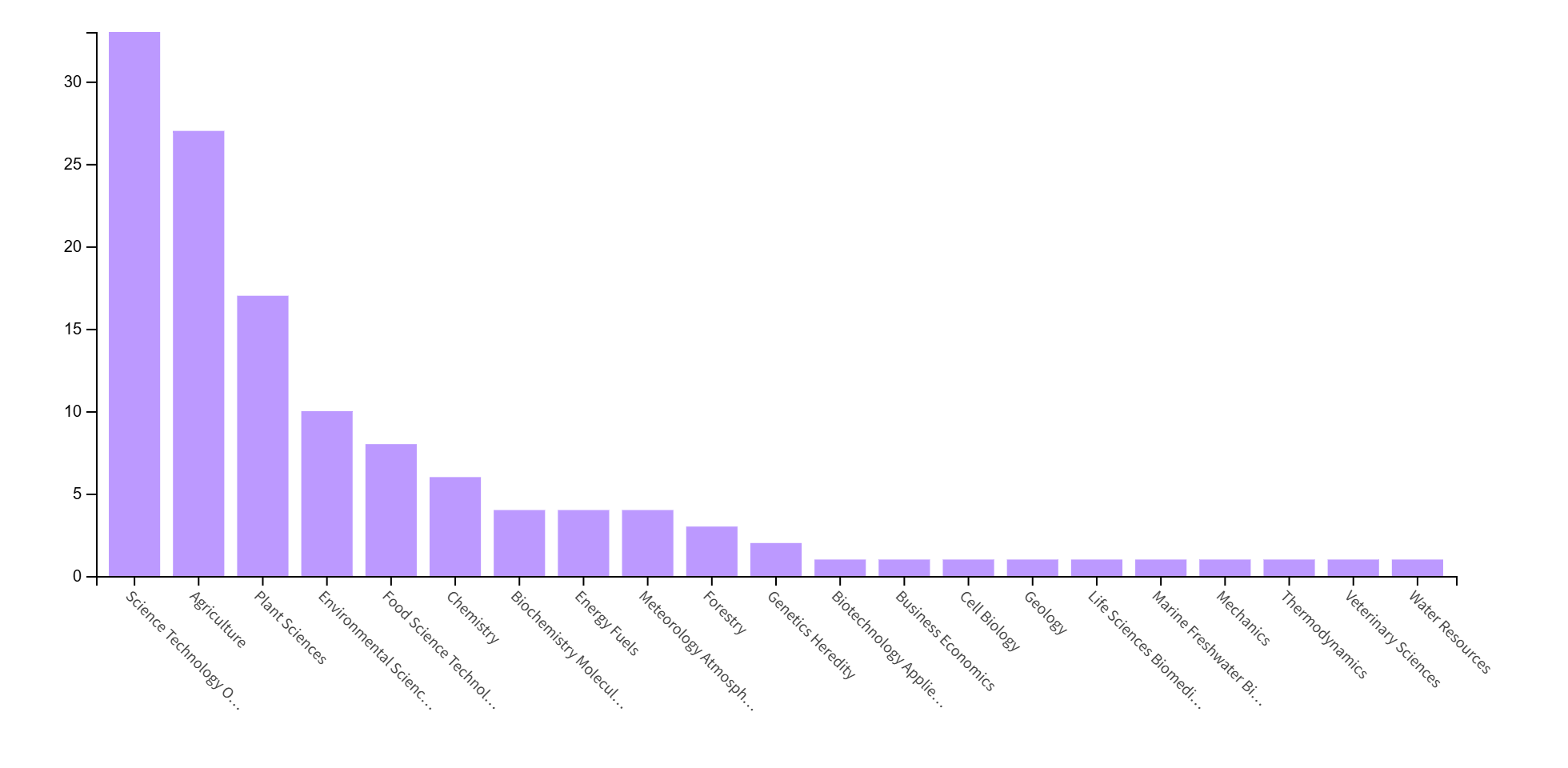
Types of published documents:
| Document Types | Record Count | % of 94 |
|---|---|---|
| Article | 87 | 92.553% |
| Review Article | 5 | 5.319% |
| Early Access | 4 | 4.255% |
| Data Paper | 3 | 3.191% |
| Correction | 2 | 2.128% |
Authors’ infographic (25):

Researcher profiles (25):
| Researchers | Record Count | % of 94 |
|---|---|---|
| Sarkar, Md Abdur Rouf | 12 | 12.766% |
| AKTER, SANJIDA | 12 | 12.766% |
| Alam, Zakaria | 12 | 12.766% |
| Nihad, Sheikh Arafat Islam | 9 | 9.574% |
| Kamruzzaman, Mohammad | 7 | 7.447% |
| Khan, Mohammad Ashik Iqbal | 7 | 7.447% |
| Latif, Mohammad Abdul | 6 | 6.383% |
| Sarker, Mou | 6 | 6.383% |
| Khan, Md Abdullah Al Mamun | 6 | 6.383% |
| Paul, Priya Lal Chandra | 5 | 5.319% |
| W. Bell, Robert | 5 | 5.319% |
| Shozib, Habibul Bari | 5 | 5.319% |
| Kabir, Md Shaha Nur | 5 | 5.319% |
| SHAHID, SHAMSUDDIN | 4 | 4.255% |
| Sarker, Prof. Umakanta | 4 | 4.255% |
| Rahman, Mohammad Chhiddikur | 4 | 4.255% |
| Bhandari, Humnath | 4 | 4.255% |
| Biswas, Jatish C. | 4 | 4.255% |
| Mainuddin, Mohammed | 4 | 4.255% |
| Mamun, Md Abdullah Al | 4 | 4.255% |
| Alam, Edris | 3 | 3.191% |
| Hossain, Akbar | 3 | 3.191% |
| Rahman, Mezanur | 3 | 3.191% |
| Islam, Mohammad Ariful | 3 | 3.191% |
| ISLAM, KAMRUL | 3 | 3.191% |
Research affiliations of BRRI with other universities and institutes:
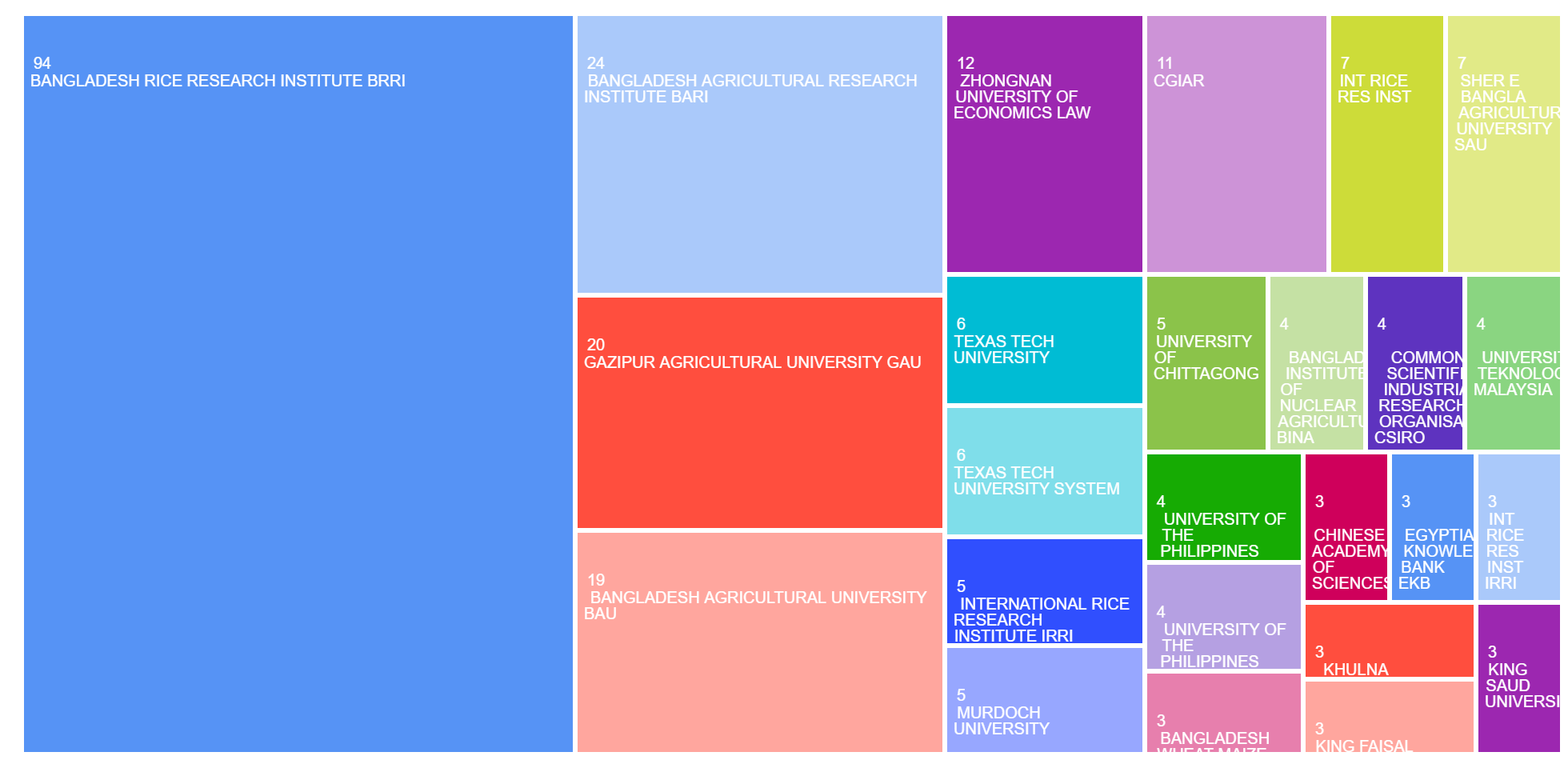
Research collaboration countries:
- Bangladesh: 94 (100.000%)
- People’s Republic of China: 19 (20.213%)
- United States: 18 (19.149%)
- Australia: 14 (14.894%)
- Saudi Arabia: 11 (11.702%)
- India: 9 (9.574%)
- Philippines: 7 (7.447%)
- Japan: 5 (5.319%)
- Malaysia: 4 (4.255%)
- South Korea: 4 (4.255%)
- Egypt: 3 (3.191%)
- United Arab Emirates: 3 (3.191%)
- England: 2 (2.128%)
- Iran: 2 (2.128%)
- Iraq: 2 (2.128%)
- Canada: 1 (1.064%)
- Germany: 1 (1.064%)
- Kenya: 1 (1.064%)
- New Zealand: 1 (1.064%)
- Nigeria: 1 (1.064%)
- Oman: 1 (1.064%)
- Pakistan: 1 (1.064%)
- Sweden: 1 (1.064%)
- Tajikistan: 1 (1.064%)
- Turkey: 1 (1.064%)
Sustainable development goals:
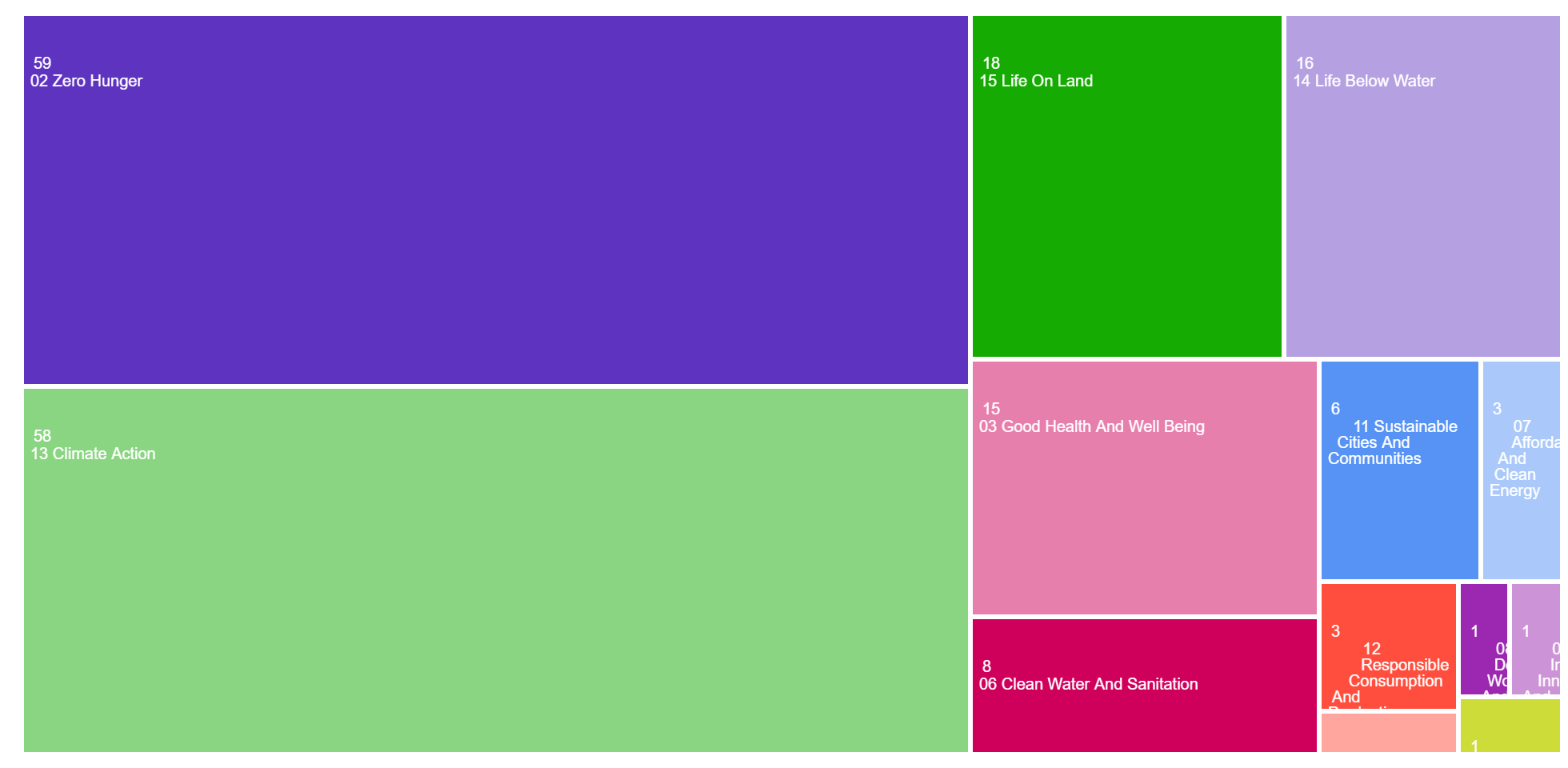
The publishers:
Funding Agencies:
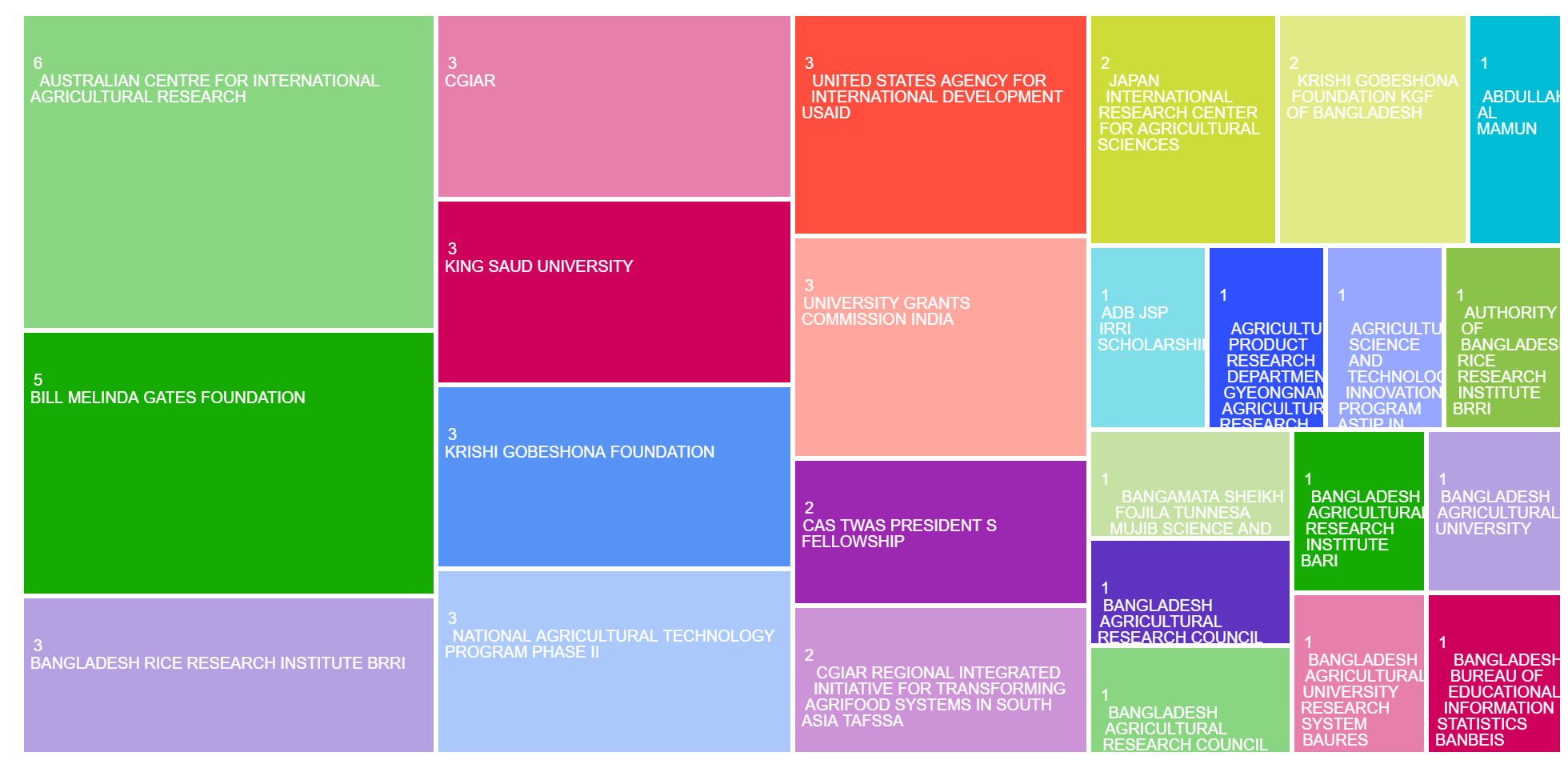
Research Highlights of BRRI:
| Type | Result |
|---|---|
| Review Article | 5 |
| Early Access | 4 |
| Open Access | 67 |
| Enriched Cited References | 49 |
| Open publisher-invited reviews | 1 |
Observations:
-
Diverse Research Focus: The Bangladesh Rice Research Institute (BRRI) publications cover a wide range of disciplines, with Multidisciplinary Sciences, Plant Sciences, and Agronomy being prominent categories, reflecting the institute’s comprehensive approach to rice research.
-
Dominant Publication Types: Articles constitute the majority of BRRI’s Web of Science publications, followed by Review Articles and Early Access papers, indicating a strong emphasis on original research.
-
Global Collaboration: BRRI’s research involves significant international collaboration, with contributions from countries like the People’s Republic of China, the United States, and Australia, highlighting its global research network.
Questions:
-
How does the high proportion of articles compared to other document types impact the dissemination of BRRI’s research findings?
-
What factors contribute to the strong presence of Multidisciplinary Sciences in BRRI’s publication categories?
-
How do international collaborations influence the quality and scope of BRRI’s research outputs?
The BRRI’s 2024 Web of Science publications demonstrate a robust research output with a clear focus on advancing rice science through diverse disciplines and global partnerships, underscoring its critical role in addressing agricultural challenges in Bangladesh and beyond.



